Zetian Sun
KaLM-Embedding-V2: Superior Training Techniques and Data Inspire A Versatile Embedding Model
Jun 26, 2025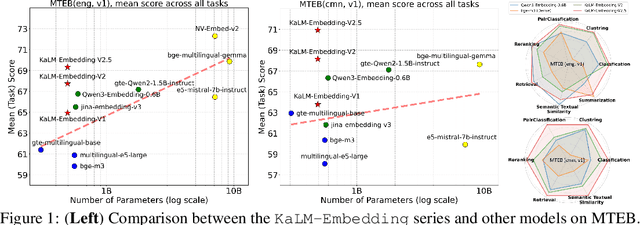



Abstract:In this paper, we propose KaLM-Embedding-V2, a versatile and compact embedding model, which achieves impressive performance in general-purpose text embedding tasks by leveraging superior training techniques and data. Our key innovations include: (1) To better align the architecture with representation learning, we remove the causal attention mask and adopt a fully bidirectional transformer with simple yet effective mean-pooling to produce fixed-length embeddings; (2) We employ a multi-stage training pipeline: (i) pre-training on large-scale weakly supervised open-source corpora; (ii) fine-tuning on high-quality retrieval and non-retrieval datasets; and (iii) model-soup parameter averaging for robust generalization. Besides, we introduce a focal-style reweighting mechanism that concentrates learning on difficult samples and an online hard-negative mixing strategy to continuously enrich hard negatives without expensive offline mining; (3) We collect over 20 categories of data for pre-training and 100 categories of data for fine-tuning, to boost both the performance and generalization of the embedding model. Extensive evaluations on the Massive Text Embedding Benchmark (MTEB) Chinese and English show that our model significantly outperforms others of comparable size, and competes with 3x, 14x, 18x, and 26x larger embedding models, setting a new standard for a versatile and compact embedding model with less than 1B parameters.
Improving Value-based Process Verifier via Structural Prior Injection
Feb 21, 2025Abstract:In the Large Language Model(LLM) reasoning scenario, people often estimate state value via Monte Carlo sampling. Though Monte Carlo estimation is an elegant method with less inductive bias, noise and errors are inevitably introduced due to the limited sampling. To handle the problem, we inject the structural prior into the value representation and transfer the scalar value into the expectation of a pre-defined categorical distribution, representing the noise and errors from a distribution perspective. Specifically, by treating the result of Monte Carlo sampling as a single sample from the prior ground-truth Binomial distribution, we quantify the sampling error as the mismatch between posterior estimated distribution and ground-truth distribution, which is thus optimized via distribution selection optimization. We test the performance of value-based process verifiers on Best-of-N task and Beam search task. Compared with the scalar value representation, we show that reasonable structural prior injection induced by different objective functions or optimization methods can improve the performance of value-based process verifiers for about 1$\sim$2 points at little-to-no cost. We also show that under different structural prior, the verifiers' performances vary greatly despite having the same optimal solution, indicating the importance of reasonable structural prior injection.
KaLM-Embedding: Superior Training Data Brings A Stronger Embedding Model
Jan 03, 2025



Abstract:As retrieval-augmented generation prevails in large language models, embedding models are becoming increasingly crucial. Despite the growing number of general embedding models, prior work often overlooks the critical role of training data quality. In this work, we introduce KaLM-Embedding, a general multilingual embedding model that leverages a large quantity of cleaner, more diverse, and domain-specific training data. Our model has been trained with key techniques proven to enhance performance: (1) persona-based synthetic data to create diversified examples distilled from LLMs, (2) ranking consistency filtering to remove less informative samples, and (3) semi-homogeneous task batch sampling to improve training efficacy. Departing from traditional BERT-like architectures, we adopt Qwen2-0.5B as the pre-trained model, facilitating the adaptation of auto-regressive language models for general embedding tasks. Extensive evaluations of the MTEB benchmark across multiple languages show that our model outperforms others of comparable size, setting a new standard for multilingual embedding models with <1B parameters.
CMT: A Memory Compression Method for Continual Knowledge Learning of Large Language Models
Dec 10, 2024



Abstract:Large Language Models (LLMs) need to adapt to the continuous changes in data, tasks, and user preferences. Due to their massive size and the high costs associated with training, LLMs are not suitable for frequent retraining. However, updates are necessary to keep them in sync with rapidly evolving human knowledge. To address these challenges, this paper proposes the Compression Memory Training (CMT) method, an efficient and effective online adaptation framework for LLMs that features robust knowledge retention capabilities. Inspired by human memory mechanisms, CMT compresses and extracts information from new documents to be stored in a memory bank. When answering to queries related to these new documents, the model aggregates these document memories from the memory bank to better answer user questions. The parameters of the LLM itself do not change during training and inference, reducing the risk of catastrophic forgetting. To enhance the encoding, retrieval, and aggregation of memory, we further propose three new general and flexible techniques, including memory-aware objective, self-matching and top-aggregation. Extensive experiments conducted on three continual learning datasets (i.e., StreamingQA, SQuAD and ArchivalQA) demonstrate that the proposed method improves model adaptability and robustness across multiple base LLMs (e.g., +4.07 EM & +4.19 F1 in StreamingQA with Llama-2-7b).
FunnelRAG: A Coarse-to-Fine Progressive Retrieval Paradigm for RAG
Oct 14, 2024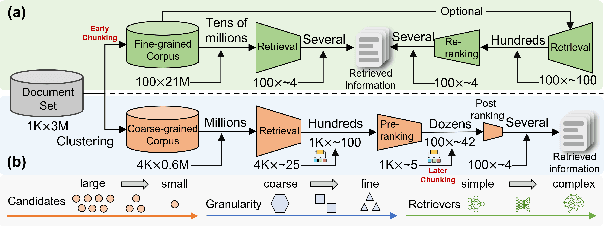

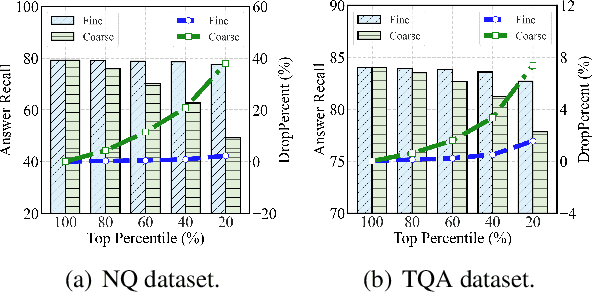
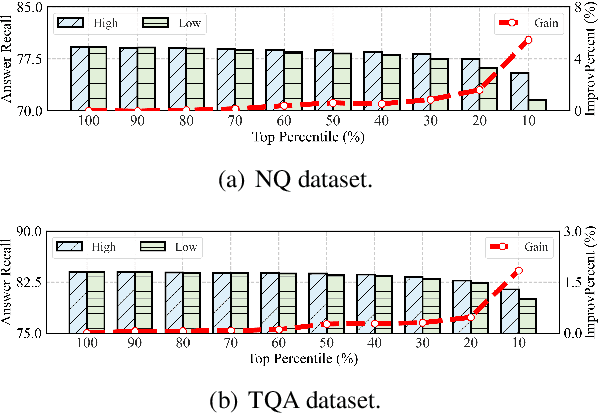
Abstract:Retrieval-Augmented Generation (RAG) prevails in Large Language Models. It mainly consists of retrieval and generation. The retrieval modules (a.k.a. retrievers) aim to find useful information used to facilitate generation modules (a.k.a. generators). As such, generators' performance largely depends on the effectiveness and efficiency of retrievers. However, the retrieval paradigm that we design and use remains flat, which treats the retrieval procedures as a one-off deal with constant granularity. Despite effectiveness, we argue that they suffer from two limitations: (1) flat retrieval exerts a significant burden on one retriever; (2) constant granularity limits the ceiling of retrieval performance. In this work, we propose a progressive retrieval paradigm with coarse-to-fine granularity for RAG, termed FunnelRAG, so as to balance effectiveness and efficiency. Specifically, FunnelRAG establishes a progressive retrieval pipeline by collaborating coarse-to-fine granularity, large-to-small quantity, and low-to-high capacity, which can relieve the burden on one retriever and also promote the ceiling of retrieval performance. Extensive experiments manifest that FunnelRAG achieves comparable retrieval performance while the time overhead is reduced by nearly 40 percent.
In-Context Learning State Vector with Inner and Momentum Optimization
Apr 17, 2024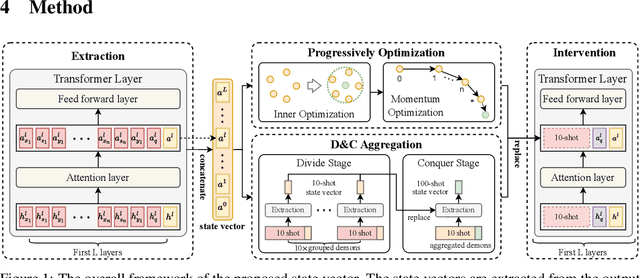
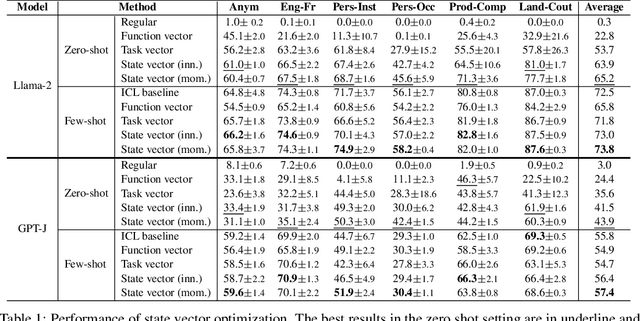
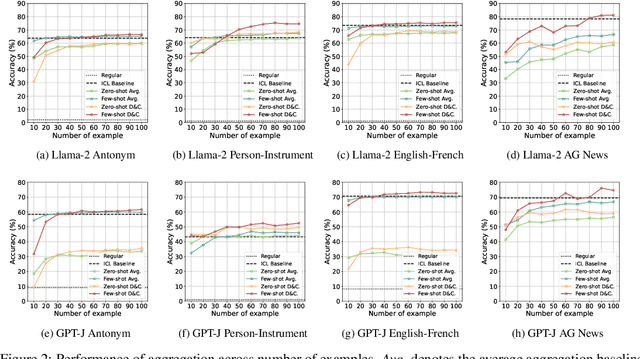
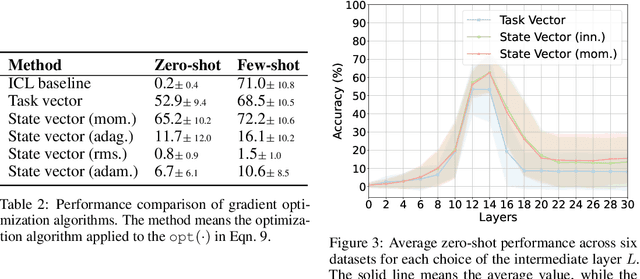
Abstract:Large Language Models (LLMs) have exhibited an impressive ability to perform In-Context Learning (ICL) from only a few examples. Recent works have indicated that the functions learned by ICL can be represented through compressed vectors derived from the transformer. However, the working mechanisms and optimization of these vectors are yet to be thoroughly explored. In this paper, we address this gap by presenting a comprehensive analysis of these compressed vectors, drawing parallels to the parameters trained with gradient descent, and introduce the concept of state vector. Inspired by the works on model soup and momentum-based gradient descent, we propose inner and momentum optimization methods that are applied to refine the state vector progressively as test-time adaptation. Moreover, we simulate state vector aggregation in the multiple example setting, where demonstrations comprising numerous examples are usually too lengthy for regular ICL, and further propose a divide-and-conquer aggregation method to address this challenge. We conduct extensive experiments using Llama-2 and GPT-J in both zero-shot setting and few-shot setting. The experimental results show that our optimization method effectively enhances the state vector and achieves the state-of-the-art performance on diverse tasks. Code is available at https://github.com/HITsz-TMG/ICL-State-Vector
Improving Attributed Text Generation of Large Language Models via Preference Learning
Mar 27, 2024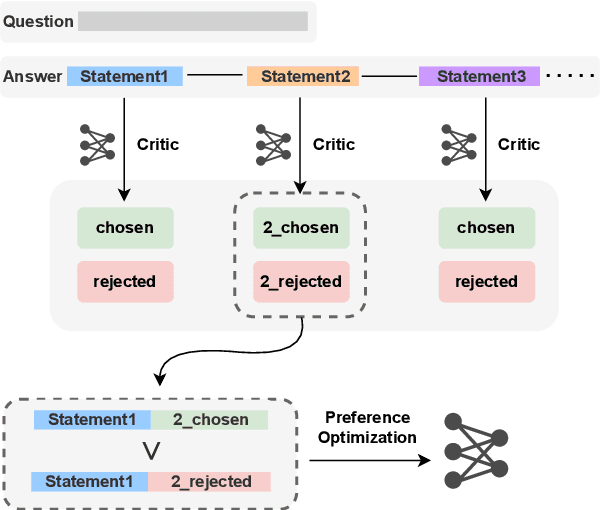
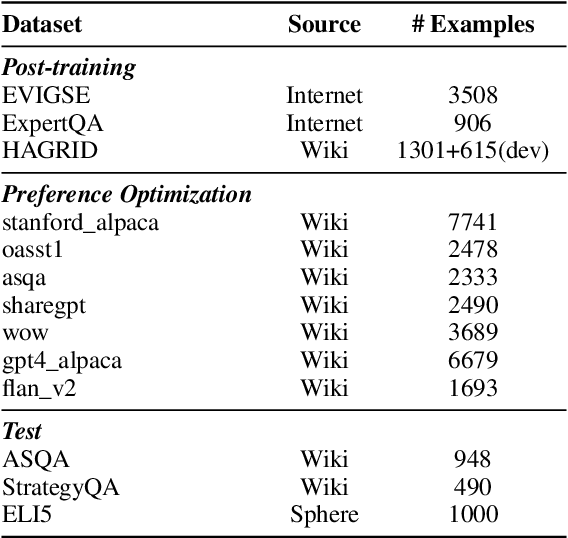

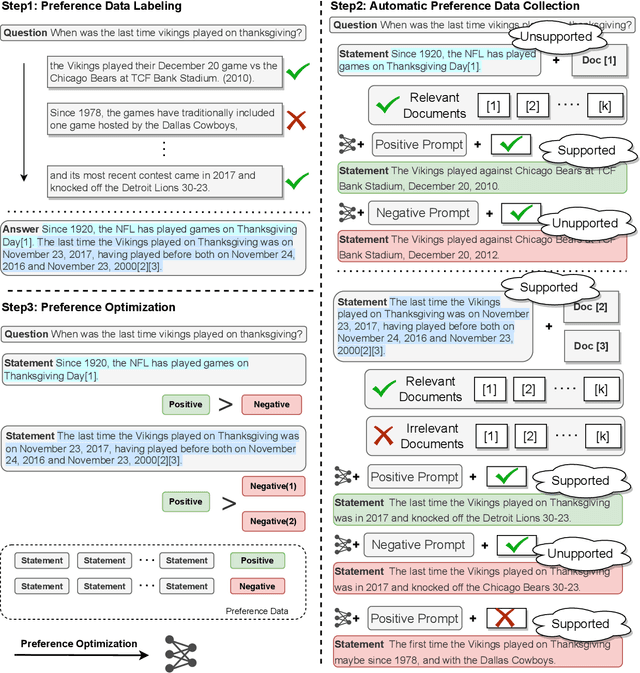
Abstract:Large language models have been widely adopted in natural language processing, yet they face the challenge of generating unreliable content. Recent works aim to reduce misinformation and hallucinations by resorting to attribution as a means to provide evidence (i.e., citations). However, current attribution methods usually focus on the retrieval stage and automatic evaluation that neglect mirroring the citation mechanisms in human scholarly writing to bolster credibility. In this paper, we address these challenges by modelling the attribution task as preference learning and introducing an Automatic Preference Optimization (APO) framework. First, we create a curated collection for post-training with 6,330 examples by collecting and filtering from existing datasets. Second, considering the high cost of labelling preference data, we further propose an automatic method to synthesize attribution preference data resulting in 95,263 pairs. Moreover, inspired by the human citation process, we further propose a progressive preference optimization method by leveraging fine-grained information. Extensive experiments on three datasets (i.e., ASQA, StrategyQA, and ELI5) demonstrate that APO achieves state-of-the-art citation F1 with higher answer quality.
A Survey of Large Language Models Attribution
Nov 07, 2023Abstract:Open-domain generative systems have gained significant attention in the field of conversational AI (e.g., generative search engines). This paper presents a comprehensive review of the attribution mechanisms employed by these systems, particularly large language models. Though attribution or citation improve the factuality and verifiability, issues like ambiguous knowledge reservoirs, inherent biases, and the drawbacks of excessive attribution can hinder the effectiveness of these systems. The aim of this survey is to provide valuable insights for researchers, aiding in the refinement of attribution methodologies to enhance the reliability and veracity of responses generated by open-domain generative systems. We believe that this field is still in its early stages; hence, we maintain a repository to keep track of ongoing studies at https://github.com/HITsz-TMG/awesome-llm-attributions.
 Add to Chrome
Add to Chrome Add to Firefox
Add to Firefox Add to Edge
Add to Edge